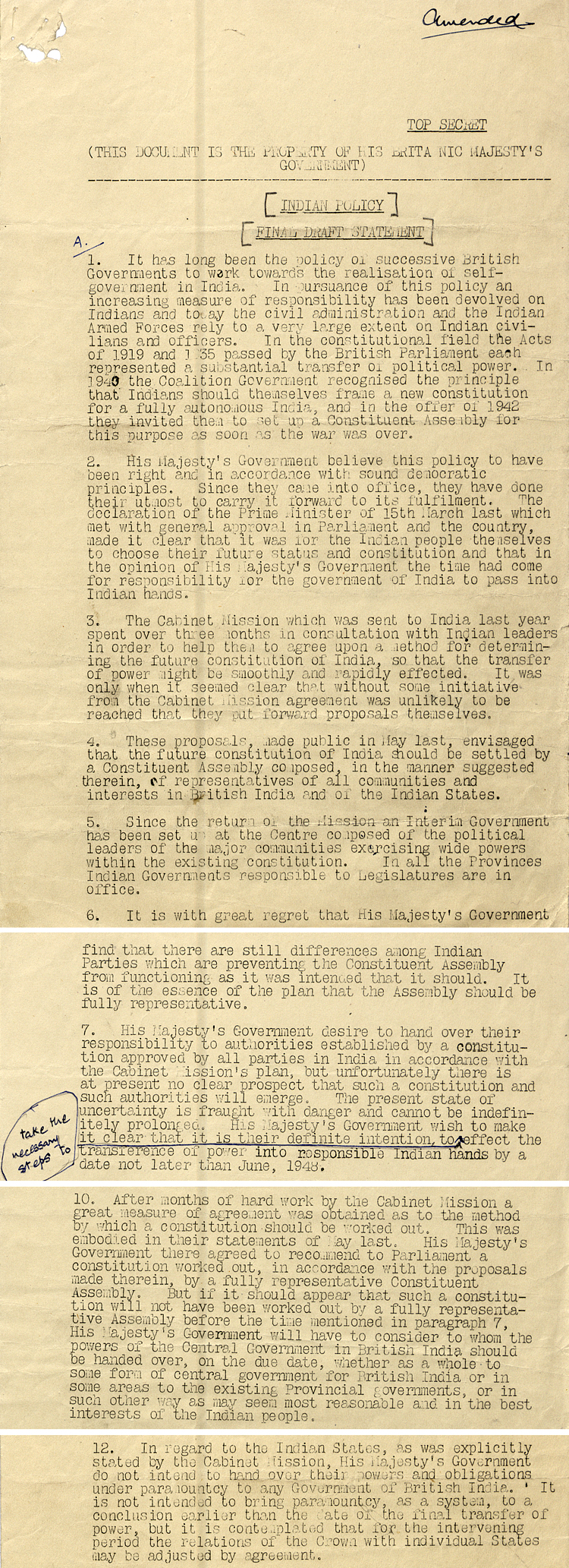
Draft statement of Britain’s India policy prepared by Secretary of State for India for the British Ambassador in Washington, 20th February 1947 (FO 371/63529)
Transcript
TOP SECRET
[INDIAN POLICY]
[FINAL DRAFT STATEMENT]
1. It has long been the policy of successive British Governments to work towards the realisation of self government in India. In pursuance of this policy an increasing measure of responsibility has been devolved on Indians and today the civil administration and the Indian Armed Forces rely to a very large extent on Indian civilians and officers. In the constitutional field the Acts of 1919 and 1935 passed by the British Parliament each represented a substantial transfer of political power. In 1940 the Coalition Government recognised the principle that Indians should themselves frame a new constitution for a fully autonomous India, and in the offer of 1942 they invited them to set up a Constituent Assembly for this purpose as soon as the war was over.
2. His Majesty’s Government believe this policy to have been the right and in accordance with sound democratic principles. Since they came into office, they have done their utmost to carry it forward to its fulfilment. The declaration of the Prime Minister of 15th March last which met with general approval in Parliament and the country, made it clear that it was for the Indian people themselves to chose their future status and constitution and that in the opinion of Her Majesty’s Government the time had come for responsibility for government of India to pass into Indian hands.
3. The Cabinet Mission which was sent to India last year spent over three months in consultation with Indian leaders in order to help them agree upon a method for determining the future constitution of India, so that the transfer of power might be smoothly and rapidly effected. It was only when it seemed clear that without some initiative from the Cabinet Mission agreement was unlikely to be reached that they put forward proposals themselves.
4. These proposals, made public in May last, envisaged that the future constitution of India should be settled by Constituent Assembly composed, in the manner suggested therein, of representatives of all communities and interests in British India and of the Indian States.
5. Since the return of the Mission an Interim Government has been set up at the centre composed of the political leaders of the major communities exercising wide powers within the existing constitution. In all the Provinces Indian Governments responsible to Legislatures are in office.
6. It is with great regret that His Majesty’s Government find there are still differences among Indian parties which are preventing the Constituent Assembly from functioning as it was intended that it should. It is the essence of the plan that the Assembly should be fully representative.
7. His Majesty’s Government desire to hand over their responsibility to authorities established by a constitution approved by all parties in India in accordance with the Cabinet Mission’s plan, but unfortunately there is at present no clear prospect that such a constitution and such authorities will emerge. The present state of uncertainty is fraught with danger and cannot be indefinitely prolonged. His Majesty’s Government wish to make it clear that it is their definite intention to effect the transference of power into responsible India hands by a date no later than June 1948.
…
10. After months of hard work by the Cabinet Mission a great measure of agreement was obtained as to the method by which the constitution should be worked out. This was embodied in their statements of May last. His Majesty’s Government there agreed to recommend to Parliament a constitution there worked out, in accordance with the proposals made therein, by a fully representative Constituent Assembly. But if it should appear that such a constitution will nothave been worked out by a fully representative Assembly before the time mentioned in paragraph 7, His Majesty’s Government will have to consider to whom the powers of the Central Government in British India should be handed over, on the due date, whether as a whole to some form of central government for British India or in some areas to the existing Provincial governments, or in such other way as may seem most reasonable and in the best interests of the Indian people.
…
12. In regard to the Indian States, as was explicitly stated by the Cabinet Mission, His Majesty’s Government do not intend to hand over their powers and obligations under paramountcy to any Government of British India. It is not intended to bring paramountcy , as a system, to a conclusion earlier than the date of the final transfer of power, but it is contemplated that for the intervening period the relations of the Crown with individual states may be adjusted by agreement.
